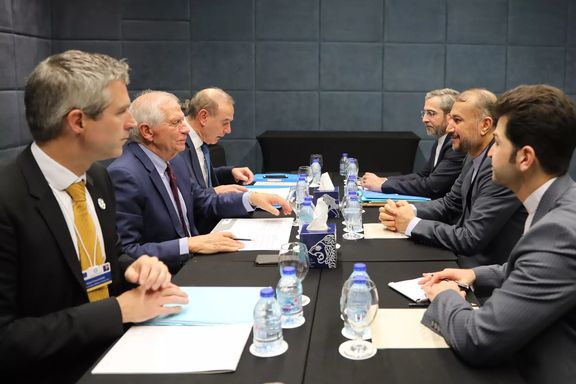Experts In Iran Slam Tehran’s ‘Ideological’ Foreign Policy

Debates on Iran's unsuccessful foreign policy and the Raisi administration's obvious weakness in this area have come into the spotlight in Iranian media.

Debates on Iran's unsuccessful foreign policy and the Raisi administration's obvious weakness in this area have come into the spotlight in Iranian media.
The debate began following Foreign Minister Hossein Amir Abdollahian and chief nuclear negotiator Ali Bagheri's reportedly unsuccessful meeting with EU foreign policy chief Josep Borrell in Amman.
Iranian academic Pirouz Mojtahedzadeh said in an interview with Didban Iranwebsite that "Iran's foreign policy is bankrupt." He charged that Iran's diplomats are not well experienced and well trained, adding that Tehran's foreign policy is ideological. He also charged that IRGC generals are the wrong people in the foreign relations arena.
Elsewhere in the interview Mojtahedzadeh argued that the foreign ministry should have a technical rather than ideological approach to foreign policy, adding that Iran needs skilled diplomats who can at least speak English. He said Iranian diplomats should confront their international counterparts, even US diplomats based on the country's national interests rather than any ideology.
Meanwhile, criticizing Tehran's foreign policy priorities which is evident from its attempts to get closer to Moscow and Beijing. He lashed out at China for "its double-standards in the region" and said "Russia will also let us down."

Career diplomats such as Ahmad Azizi have also expressed disappointment over the performance of the foreign minister and his team. Azizi, a former deputy foreign minister, ambassador to Germany and the broker of the deal with the United States over releasing US diplomats who were taken hostage in Iran following the 1979 seizure of the US embassy in Tehran, wrote in a letter to Kamal Kharrazi, the head of Khamenei's Foreign Relations Council that "The foreign minister cannot do anything. Please think of a solution yourself."
Azizi said in the letter that "the chronic and painful crisis of sanctions needs an urgent solution." Meanwhile, he stressed: "The problem is that we have never thought of any problem as a crisis!" He reiterated that solving many of Iran's problems,” including the current economic pressure on the people, “depend on tackling the crisis of sanctions."
According to the letter, published as an op-ed in the reformist daily Etemad, "The routes to decision making in Iran are closed in the Iranian political system which is facing a catalogue of crises. "
As a result of these crises, Iranians' shopping baskets have become increasingly smaller while there is no solution in sight for the problems of industries and entrepreneurship including rising unemployment figures and the government's indecision about the future of the young generation.
The biggest hurdle is opposition by Iran's hardliners to reviving the 2015 nuclear deal based on their ideological, anti-US stance. On Thursday, Hossein Shariatmadari the editor of Khamenei-funded ultraconservative Kayhan newspaper lashed out at Iranian negotiators and diplomats for expressing readiness for a deal with the West during the meeting in Amman.
He wrote: "Why did you say you were ready for negotiations over the JCPOA while Europe and the United States are insisting on their support for Iranian rioters [protesters]?" Other Iranian media including Didban have said that Shariatmadari's opposition to renewed negotiations reveals that a key part of the Iranian government opposes the revival of the talks.
Shariatmadari's connection to Khamenei, once again point fingers at the Supreme Leader as the main obstacle to a deal that could save ordinary Iranians from a long-standing financial misery.